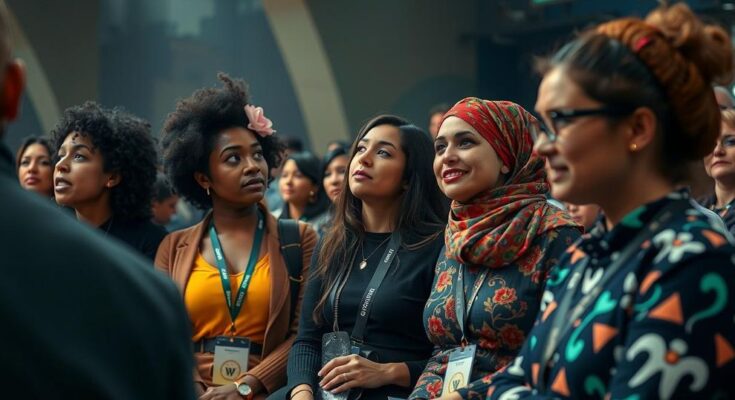The UN’s latest report on gender equality reveals insufficient progress under SDG 5, exacerbated by the rise of organized anti-rights movements challenging women’s and LGBTQI+ rights. Feminist activists confront this backlash through resource mobilization, strategic alliances, and evidence generation, although funding and civic spaces remain under threat. The fight for gender equality necessitates ongoing collaboration and advocacy at international levels.
The UN’s recent “Gender Snapshot” report indicates no full achievement of Sustainable Development Goal 5, emphasizing the ongoing struggle for gender equality. Amid some progress, a rising conservative anti-rights movement threatens to reverse existing gains. This movement has fostered unusual alliances and gained financial backing, enabling them to challenge women’s and LGBTQI+ rights globally, especially within the UN framework. This anti-rights movement employs comprehensive tactics, from public protests at events like the Commission on the Status of Women to covert lobbying among UN member states. They strategically manipulate human rights discourse, promoting concepts like “natural rights” to undermine women’s reproductive health rights and LGBTQI+ protections. Additionally, they’ve built a strong network of think tanks and academic support to legitimize their claims. In opposition to this backlash, feminist activists are employing varied strategies to defend hard-won rights and promote new initiatives in international forums. They are working to mobilize resources for underfunded women’s and LGBTQI+ organizations, striving for better funding models, and ensuring sufficient financial support to combat anti-rights efforts. Feminist organizations also focus on strengthening alliances that represent diverse groups, including LGBTQI+ individuals. These collaborations bolster collective action and visibility at global meetings, amplifying their shared objectives, and fostering inclusive dialogues. Examples include initiatives like SheDecides and FEMNET, which unite voices across the spectrum of gender rights. Furthermore, gathering robust evidence on anti-rights movements aids in understanding their strategies and impacts. Documenting these narratives and best practices enables women’s rights organizations to counter adverse claims effectively and build counternarratives. Projects like Open Democracy’s “Tracking the Backlash” exemplify this data-driven approach. With civic spaces dwindling, feminist groups are finding innovative ways to share resources and organize events crucial for fostering discussion and collaboration. Global conferences like Women Deliver serve as critical platforms for advocates to exchange ideas and spur action surrounding gender equality. Direct advocacy at the UN is vital in this battle; despite the problematic environment, it provides a venue for collaboration between feminist activists and supportive member states. Building these “gender-friendly” alliances is essential to influence resolution content, both in New York and Geneva. Despite numerous challenges, the international feminist movement persists in countering anti-gender backlash. They are connecting local and global actors while raising awareness about norm-spoiling. For significant progress in gender equality, collaboration among donors, government allies, and feminist organizations is crucial to protect gender norms and push for inclusive rights.
As reports reveal ongoing struggles in achieving gender equality, the rise of an anti-rights movement at the UN has become a pressing concern. This conservative movement, with its well-funded and organized structure, poses threats to the rights of women and LGBTQI+ individuals by creating coalitions that work against established commitments to gender equality. Understanding the tactics employed by these movements, as well as the strategies of feminist activists, illuminates the broader contestation of women’s rights. The tactics of the anti-rights movement have evolved to include both visible public demonstrations and behind-the-scenes lobbying, influencing the discourse around gender equality significantly. In response, feminist organizations are mobilizing resources, forming diverse alliances, and documenting evidence to counteract the increasing anti-rights narratives. This intricate dance between opposing forces within the global gender equality landscape highlights the urgent need for solidarity and strategic action among allies committed to women’s rights.
The growing anti-rights movement presents significant challenges to global gender equality efforts, as revealed by the UN’s Gender Snapshot report. However, feminist activists are resolutely working to counter this backlash through resource mobilization, forming coalition alliances, and generating data-driven strategies. Despite limited funding and shrinking civic spaces, the movement persists in advocating for women’s rights at international levels. To achieve lasting advancements, collaboration among feminists, donors, and supportive governments remains critical.
Original Source: theglobalobservatory.org



